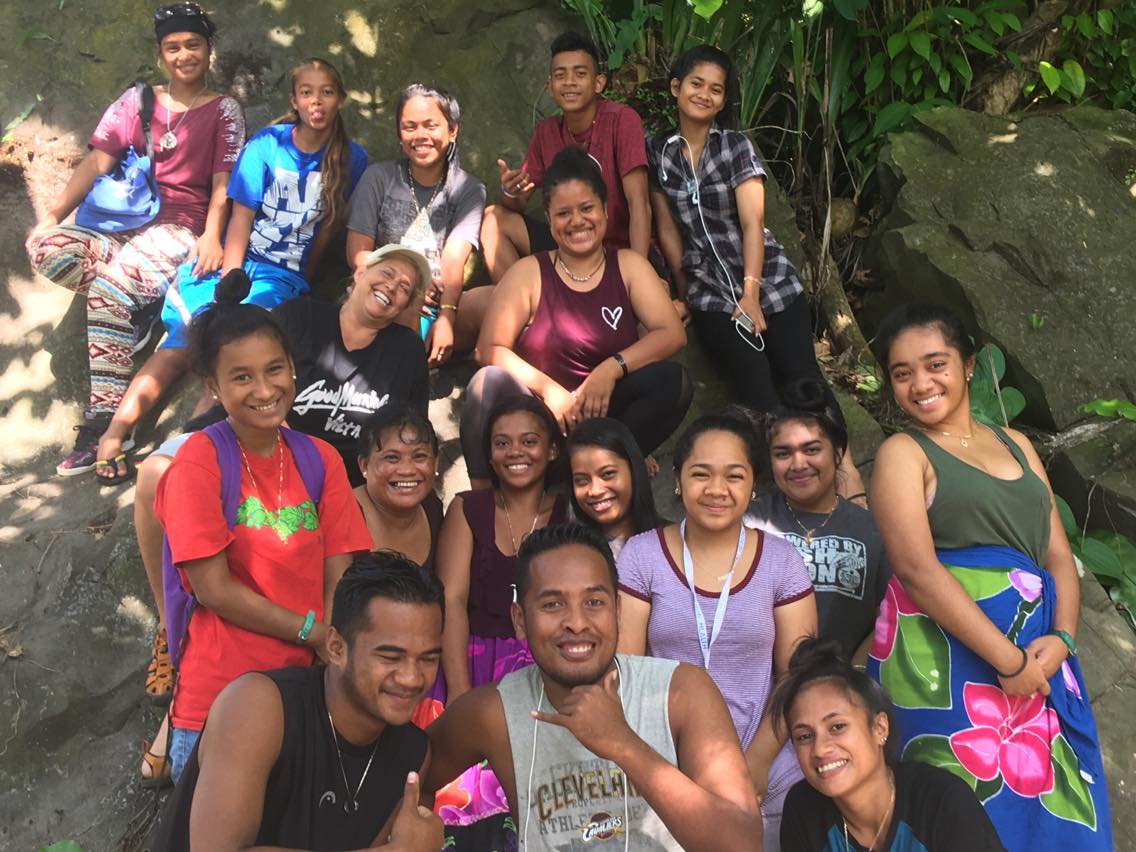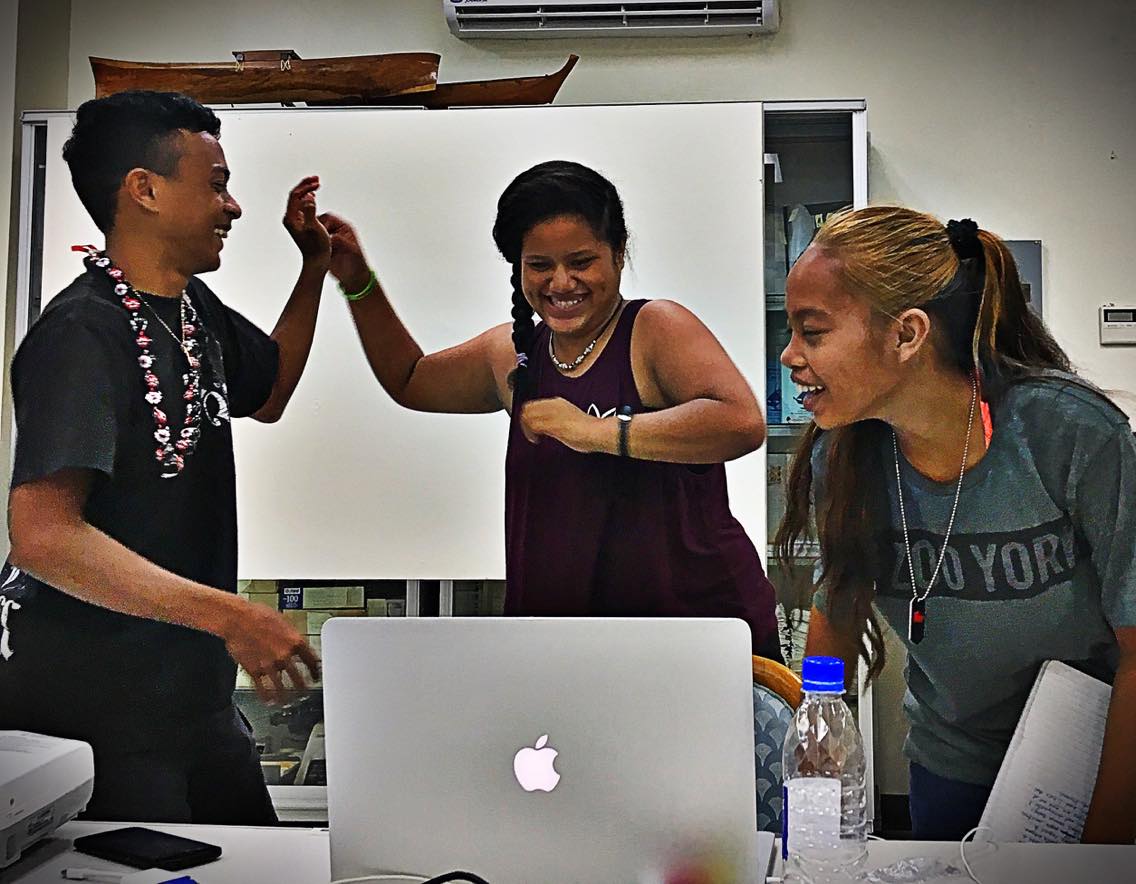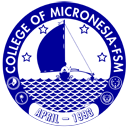Students Celebrate Micronesian History and Contemporary Island Issues through filmmaking
 By Denise Oen and Delihna Ehmes
By Denise Oen and Delihna Ehmes
The College of Micronesia is taking innovative measures to ensure student success. This summer, we combined an English course (ESL 089) with the History of Micronesia (SS 150). The cross disciplinary course was known as Filming Our Journeys: Connecting Micronesian History to Contemporary Islander Life. Seventeen incoming freshmen enrolled and were taught by the team of Delihna Ehmes and Denise Oen.
The first two weeks of the class had a storytelling (via film) for social justice focus. Dan Lin (a well-known photographer and filmmaker) and Canita Rilomento (an experienced community educator) both of the Pacific Resources for Education and Learning organization, designed and implemented this workshop with the assistance of Ehmes and Oen. During these two weeks, the students learned all aspects of filmmaking from: the coming up with the original concept, to script writing, to storyboarding, to direction and filming, and then on to the final editing and eventual screening. Students were very proud of their films and shared their work with their family and friends via social media. They also held a screening for several college administrators: Maria Dison, Karen Simion, and Joseph Felix. They were so impressed with the students’ work that they requested the films be part of the orientation for new students this fall.
A key aspect of the filmmaking workshop was interviewing community leaders for their insights and guidance on continuing to improve communities in the Federated States of Micronesia. They interviewed: Bethwell Henry, Rufino Mauricio, Jennifer Helieisar, John Haglelgam, Marstella Jack, Bruce Robert, and Delihna Ehmes. The gift of hearing from these leaders was very illuminating across many issues. These interviews were then edited together to make short films. These films will be shared with the larger education community across Pohnpei.
After the workshop, the class continued with the cohort configuration of the same students in both classes with two professors. Denise taught ESL 089 and Delihna taught SS 150. They connected their course content through shared class experiences including readings, films, field trips, small group presentations, and discussions. The ESL 089 course content included contemporary islander topics which connected with the content of the History of Micronesia: Cultural Representations of Pacific Islanders. Islander Migration and Immigration, Micronesians in the Military, and Island Economics.
 We read books about the History of Micronesia, explored articles regarding contemporary island issues, watched films (Island Soldier, Whale Rider, Cannibal Tours, etc.), participated in role plays about colonialism , went on field trips (Nan Mandal, Sokhes Ridge, Sokhes Island, PMK fish market, and the Bank of the FSM.) We had many class discussions and the students learned that you need to know “why” you think the way you do because Delihna and Denise are going to ask!
We read books about the History of Micronesia, explored articles regarding contemporary island issues, watched films (Island Soldier, Whale Rider, Cannibal Tours, etc.), participated in role plays about colonialism , went on field trips (Nan Mandal, Sokhes Ridge, Sokhes Island, PMK fish market, and the Bank of the FSM.) We had many class discussions and the students learned that you need to know “why” you think the way you do because Delihna and Denise are going to ask!
Students achieved the learning outcomes in both courses and are now adept at strategies and techniques needed for college: analysis and synthesis of information, reading for information strategies, writing thoughtful and reflective essays, and creating presentations for their classmates. Their knowledge of the History of Micronesia is now substantial and the conversations throughout the summer demonstrated a critical awareness of the complexity of the multiple narratives of what has happened on the islands that they love.
Students also figured out how to be a “college student.” They learned how to be responsible for attendance and timeliness, how to work with others, how to speak publicly, and how to navigate the college system as a whole.
Another important part of the class was the creation of a “family of learners.” Using the research on Culturally Relevant and Sustaining Pedagogy, we used a “family” approach. We held class in a room which permitted classroom discussions in the round, lots of room for meeting in small groups, and even room to stretch out on the floor to work in close proximity to others. We shared our lunches, fell asleep together on the van on the way back from long field trips, and celebrated birthdays and goodbyes. We laughed and cried together during movies, “argued” during role plays, and cheered our learners on as they continued to accept every challenge we offered them.
Success can be measured in a plethora of ways. The course had a 94% completion rate and a 100% passing rate. Clearly this points to an innovation worth continuing. We also asked for student feedback and their thoughts were equally evident that this course is a move in the right direction.
- I believe this class has connected in the way Micronesians live. …We got used to each other, we grew as one even with our strong diversity. We've come to love in harmony, we're undivided, we're one family, and we’re brothers and sisters. When went on trips, we shared snacks, and we waited for others to catch up on our walk up to Sokhes Ridge. We grew as one and helped one another like a family.
- I experienced many things in this class and the best is that I got to learn more about Pohnpei’s history. I watched a lot of emotional movies, I got to know many friends in our small group work. I’m was so excited about our trips together and thankful to those guest speakers who put in their time for us. I’m so proud of myself that I can film my own movie or film it with my classmates.
- Now I have learned how to be a filmmaker, a writer, and an explorer. I’m sure I’m ready to put on my shades and face the fall semester.
We are so grateful to have had the opportunity to teach and learn with these young adults this summer and can’t wait to work with them again soon.
Student films can be viewed at the Pacific Storytellers Cooperative’s YouTube Channel
https://www.youtube.com/channel/UCw-X1qYcPkaJSUzlFu3M0Dw/videos
